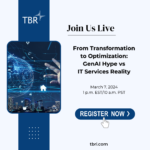KPMG Leaders Talk 2024 Priorities and Plans to Scale Execution
Ready, Steady, Scale
As part of the Big Four, KPMG has brand permission and a breadth of services relevant to nearly every role in any enterprise. TBR believes KPMG will accelerate the scale and completeness of its offerings in the coming year, building on a solid foundation and furthering the gaps between KPMG and other consulting-led, technology-enabled professional services providers.
KPMG’s four-part framework — Connected, Powered, Trusted and Elevated — resonates with clients and technology partners, provides KPMG’s professionals with clear insight into the firm’s strengths and strategy, and underpins a transformation already well underway. The coming year will challenge KPMG’s leaders to execute on the promise of that transformation during the next wave of macroeconomic pressures, talent management battles and technology revolutions.
KPMG’s leaders described their priorities as transforming the firm’s go-to-market approach, unlocking the power of the firm’s people, reimagining ways of working, and innovating capabilities and service enhancements. Success against these priorities, in TBR’s view, will come as KPMG shifts from building a foundation to scaling alongside the growing needs of its clients.
Welcome (or Welcome Back) to Lakehouse
Breaking from the traditional form for analyst events — presentations followed by special sessions and one-on-one meetings — KPMG divided the attending analysts into three groups, rotating each group through Ignition, KPMG’s immersive innovation lab experience; presentations and demos in an Innovation Showcase; and a tour of Lakehouse. A few highlights:
- In addition to walking the analysts through the typical 10-minute start of an Ignition session, recreating what KPMG’s clients experience, the firm gave the stage to a client, who shared their experiences working with KPMG. The consulting and technology solutions provided by KPMG served as useful context for the breadth of KPMG’s capabilities and the importance of using an innovation center. Most notably, the client described how their own brand depended on being a trusted partner in the communities they served and how their relationship with KPMG reinforced that trust across the full spectrum of the consultancy, the client and the client’s clients. TBR came away with a better appreciation for KPMG’s ability to extend trust and partner across its offerings and engagements.
- KPMG’s technology presentations included a wide range of solutions leveraging an array of emerging technologies such as quantum and generative AI (GenAI). Taking more than the allotted hour with TBR, the KPMG team walked through a surprising number of offerings, repeatedly coming back to two critical points: These are currently active solutions, deployed with clients and moving toward scale (i.e., not ideas undergoing testing or in beta), and KPMG boasts a breadth of technology capabilities that TBR realized was far greater than our expectations prior to the event.
- KPMG has continued to apply lessons around training and talent management to maximize the firm’s culture effects delivered by Lakehouse. As shared by KPMG’s leaders, small changes since Lakehouse opened have kept the employee experience fresh and the overall satisfaction with attending training or other kinds of sessions at Lakehouse exceptionally high. For example, KPMG learned that two and a half days of in-person sessions reduced the stress of being away from clients or engagements for a full week. By layering Monday to Wednesday and Wednesday to Friday training schedules, KPMG can bring more employees through Lakehouse without inducing training burnout or challenging employees to balance client demands with professional development time. In an informal discussion, an event guest (neither an analyst nor a KPMG employee) commented to TBR that she was amazed to see a facility that was designed for and dedicated to training.
KPMG’s decision to ease into an analyst event with small groups wandering around Lakehouse played to the firm’s strengths as approachable and multifaceted, with each of the three sessions quietly reinforcing the firm’s commitments to maintaining trust with clients, advancing technology-enabled solutions to business problems, and supporting the firm’s own people through professional development and firm culture.
While the firm is already leveraging the facility globally, one challenge for KPMG next year and beyond will be replicating Lakehouse globally. During a coffee chat shortly after the analyst event in Orlando, TBR and a senior KPMG consulting partner discussed how, whether and when the firm could open similar best-in-class training facilities in key geographies, such as Europe, the Middle East and Asia Pacific.
While Lakehouse requires a significant investment from KPMG’s legally separate member firms, TBR — and KPMG leaders who discussed the possibilities — has already seen Lakehouse expand from a training-only facility to a showcase for clients, reinforcing KPMG’s culture and the firm’s place in the professional services market.
Stick to the Mission and Tackle the Biggest Problems
Across the full day of presentations, KPMG repeatedly came back to highlighting its efforts to bring together the entire firm to deliver value to clients through a four-part framework: Connected, Powered, Trusted and Elevate. That value, according to KPMG’s leadership, began with trusted relationships with its clients, built when clients developed their business strategies and turned to KPMG for advice and validation.
Notably, according to KPMG’s leadership, pure technology companies often lack the strategy consulting permission (or people) as an enterprise begins a transformation, even if implementing new or modernizing existing technology will play a leading role. And when the technology is delivering business results, KPMG has the trusted advisor role and the skills to refresh an enterprise’s strategy.
Bringing this high-level view — which is not that different from what the other Big Four firms offer — to a more concrete understanding of KPMG’s value to its clients, TBR repeatedly heard two phrases during the Lakehouse event: “Let’s go after the core of the biggest problems you have” and “Stick to our mission.”
The first phrase demonstrates a willingness to take risks and tackle hard issues, not simply assist with marginal, if necessary, changes. In contrast, many of KPMG’s IT services competitors that are equally willing to help clients move from technology transformation pilots to enterprise-scale deployments still prioritize transactional engagements with a reduced risk mindset. (Note: TBR believes GenAI will strip 15% of the cost from current large-scale managed services contracts, a potentially existential threat to a few global systems integrators [SIs].)
The second phrase signals to TBR that KPMG’s leadership fully embraces the firm’s role within the larger services and technology ecosystem, to include where and when the firm needs to partner with technology vendors and even larger SIs. In a market flush with technology hype — GenAI today, metaverse in 2021, blockchain in 2019 — KPMG has resisted the temptation to chase technology discussions with technologists for technology’s sake and instead has focused on business decision makers looking for advice, a strategy and an execution plan. Stick to the mission. Go after the biggest problems.
Who Has the Money and Time to Build Their Own Bridge?
In a wide-ranging presentation and discussion around data, KPMG leaders acknowledged that every professional services firm emphasizes rigorous, standardized and methodical analysis of its clients’ data (when they can get it and its useful; see TBR’s Voice of the Customer research for how often that is the case).
To separate itself, KPMG leaders said the firm leans into experience, applicable industry knowledge, a dedication to methodology, and extracting value from existing assets. In TBR’s view, this last point illustrates a critical shift in enterprise buyers’ priorities that KPMG has picked up on and has begun to leverage.
In TBR’s view — and apparently KPMG’s as well — consulting and digital transformation clients want to move beyond the endless rounds of buying new technology solutions and reorient to extracting value from existing assets. To span that gap from existing data to modernized technology and transformed business, enterprises still need a bridge. KPMG has the blueprints and the experience in building those bridges, helping clients elevate and transform.
Solidifying Alliances Through Trust, Culture and Shared Values
Pivoting to alliances with technology partners, KPMG’s leaders spent a significant portion of the analyst event describing how the firm works with Google Cloud (Nasdaq: GOOG), IBM (NYSE: IBM), Oracle (NYSE: ORCL), Microsoft (Nasdaq: MSFT), ServiceNow (NYSE: NOW), Salesforce (NYSE: CRM), SAP (NYSE: SAP), Workday (Nasdaq: WDAY), and Verizon (NYSE: VZ). We cover SAP and Verizon in detail below, but a few elements came across as essential to how KPMG sees its role in the larger technology ecosystem:
- Technology partners look to KPMG for industry experience and access to buying personas at clients that technology partners simply do not have (think: CFO).
- Technology partners expect KPMG to share values, align culturally and invest in sustained relationships at multiple levels within each partner.
The first set of expectations technology partners have for KPMG do not significantly differ, if at all, from similar expectations of the other Big Four firms. The second set, in TBR’s view, demonstrates KPMG’s more focused and selective approach to alliances. Technology partners only expect cultural alignment and shared values if both parties make that a core element of the alliance.
Given the nature of other technology-plus-consultancy alliances TBR has analyzed in detail, KPMG is likely driving the emphasis around cultural fit and shared values, an effort that cannot be replicated across tens or even hundreds of alliance relationships. As will be reinforced by the following sections on SAP and Verizon, TBR sees KPMG’s alliance strategy as well suited to how the firm has built its brand around trust. As the firm continues to scale to meet clients’ needs, maintaining that emphasis on trust, culture and shared values will challenge KPMG and require careful management across the global member firms.
One final comment: One of the leaders from one of KPMG’s technology partners began their discussion by stating, “The candor and brutal honesty that they brought to the assessment reinforced KPMG’s reputation.” It is hard to imagine an endorsement more rooted in trust and shared values.
KPMG and SAP: Growing Exceptionally Fast, with Plenty of White Space Ahead
For more than a decade, KPMG’s audit relationship with SAP precluded the firm from going to market jointly with SAP and constricted KPMG’s potential relationship with the ERP giant. Unrestrained now, KPMG has the opportunity to step smartly into a competitive field currently overcrowded with services vendors looking to ride the wave of enterprises migrating to SAP S/4HANA. Separating KPMG from this pack, which includes its Big Four peers and global SI (GSI) giants like Accenture (NYSE: ACN) and Capgemini, requires executing on three key elements, in TBR’s view.
First, KPMG needs to ensure SAP’s leadership, sales teams and especially SAP S/4HANA subject matter experts understand the scale and capabilities KPMG already has and where the firm is investing — in SAP — in the near term. Convincing SAP that KPMG will bring value beyond just another consultancy or SI to SAP’s clients will help KPMG expand its small SAP footprint within existing clients.
Second, KPMG will need to continue investing in its SAP practice to ensure credible scale in a crowded marketplace in the long term. KPMG is not starting from zero, and with success in the SAP marketplace requiring integrated cloud, security and business capabilities, KPMG will have to ensure continued tight collaboration among all of these adjacent areas and the 5,000 SAP consultants it already has on its books.
Finally, with industry and domain expertise critical to successful SAP-led business transformation KPMG’s Powered Enterprise approach will be key to customer success. Aligning functional and domain expertise across SAP’s Business Technology Platform (BTP) with industry understanding will be critical to driving client value in areas like environmental, social and governance (ESG) and AI. Clients are increasingly seeking outcomes through technology investment, and the KPMG Powered approach aligns the KPMG Target Operating Model, Powered Technology and Powered Industry excellence as well as its suite of deployable assets to drive outcomes with business value.
KPMG and Verizon: Vendor Agnostic No More
If SAP is KPMG’s up-and-coming alliance, what KPMG has developed with Verizon truly distinguishes the firm from the rest of the market. In essence, KPMG and the networking giant evolved their relationship from a history of transformational engagements into what KPMG leaders describe as a collaborative “360-degree relationship” based on a foundation of trust. KPMG brings deep business intelligence and systems integration capabilities, combined with strong industry experience, going to market with Verizon and their disruptive 5G/Mobile Edge Computing technology. In addition, KPMG continues to deliver transformative work, often leveraging other key alliance partners such as ServiceNow.
Focusing initial joint go-to-market efforts around opportunities in healthcare, KPMG and Verizon have staked out complementary offerings and responsibilities. For example, as KPMG highlighted during the event, the firm “brings advanced data science and analytics capabilities through KPMG Lighthouse,” while Verizon provides “advanced multi-access edge computing and API management capabilities.” KPMG also emphasized that, specific to healthcare, the firm has launched an Innovation Lab supported by Verizon’s “private 5G infrastructure as backbone.”
Describing the array of KPMG and Verizon services, KPMG leaders noted the many offerings, such as Cloud Engineering, Platform Design & Engineering and Digital Twin, Device Simulation & Certification, that KPMG and Verizon will deliver through a joint approach, combining KPMG and Verizon professionals. In TBR’s view, this alliance stands apart from other consultancy technology alliances because of the innovation, development, go-to-market and commercialization commitments.
This is not a vendor-agnostic approach. This is picking a 5G, networking and edge provider and going all-in. Based on the presentations onstage and sidebar discussions, this all-in commitment goes both ways, with Verizon clearly seeing the value of partnering as closely as possible with KPMG.
Bringing the Right People Together and Always Making a Difference
During the afternoon sessions, TBR heard multiple client use cases, each one reinforcing KPMG’s core messages around trust, transformation, innovation and value. Three moments stood out as exemplifying precisely what makes KPMG the market-leading firm it is today:
- During a discussion on cybersecurity, KPMG’s leaders noted that the firm brings security experts, industry subject matter experts and even tax professionals to Ignition Center engagements, stressing that this approach — which includes the whole KPMG team — serves multiple purposes. First, the client can appreciate the full range of KPMG’s capabilities and offerings. Second, this approach allows the client (in this case, the chief information security officer [CISO]) to see the business from others’ perspectives. Third, KPMG creates a collective, trusted, collaborative environment, focused on both innovation and core business problems.
- In a presentation by KPMG, one of its clients and one of its technology partners (Oracle), the client said one key criterion in selecting KPMG was the firm’s credibility in always being able to deliver the right people at the right time who understand the right technology. Trusted relationships depend on dependability and consistent delivery. This client case proved KPMG’s commitment and reinforced that KPMG has been building needed scale.
- Lastly, dinner at Lakehouse included a panel discussion featuring LPGA’s Commissioner Mollie Marcoux Samaan, and the assistant U.S. team captain, golf pro Angela Stanford, both arriving directly from the 2023 Solheim Cup in Spain, where the U.S. had its best ever score on European soil. According to the LPGA guests, KPMG provided analytics-enabled insights and on-site support to help the U.S. team pick the right pairings over the course of the tournament, bringing data and additional rigor to intensely personal and often challenging decisions. As a use case, few of KPMG’s enterprise clients will need the firm’s help pairing golfers to win a tournament, but every client will likely lean on KPMG for assistance with data-driven decisions.
At the start of 2024, KPMG has positioned itself well to sustain its core values, bring transformation to clients and continue to scale. Now comes the execution of that strategy.
Note: KPMG also shared specific details about its alliances with ServiceNow, Salesforce, Workday, Microsoft and Oracle. These details will be included in TBR’s ongoing coverage of KPMG and in upcoming ecosystem reports.



 Technology Business Research, Inc.
Technology Business Research, Inc.